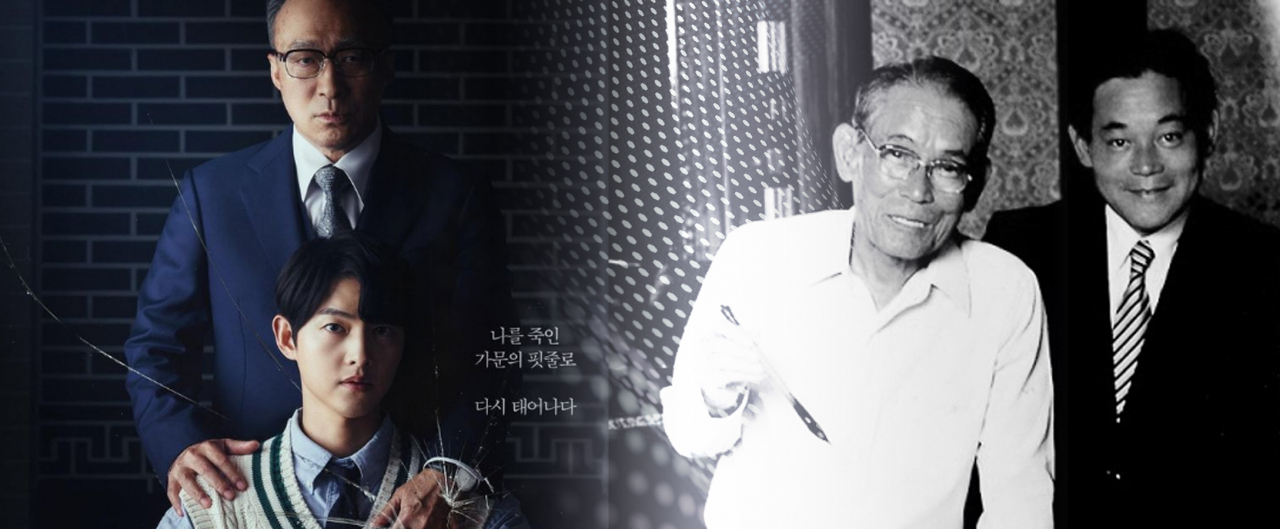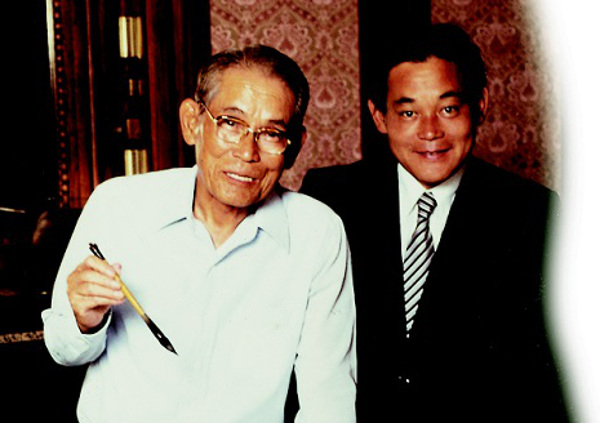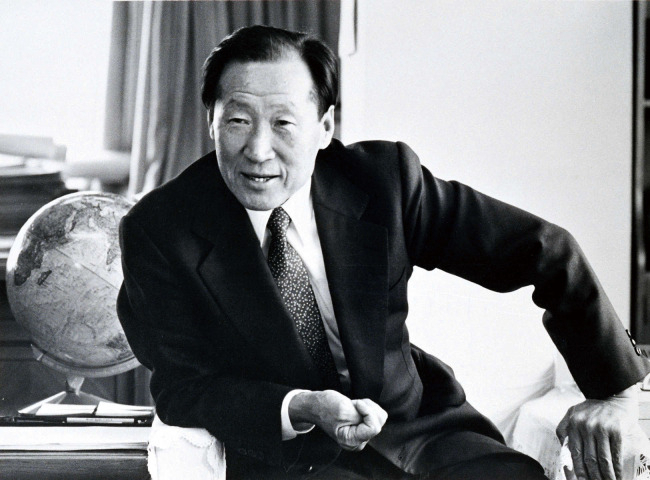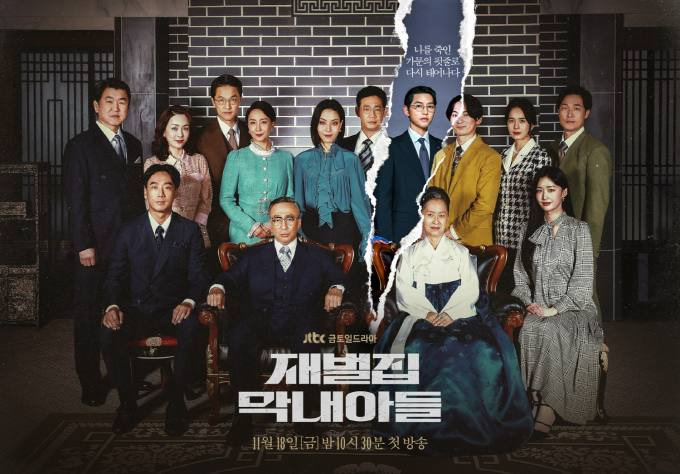[Newsmaker] JTBC’s ‘Reborn Rich’ intrigues with enigmatic chaebol stories
Hit series draws from real-life stories of chaebol, a subject of both admiration and disdain
By Jo He-rimPublished : Dec. 13, 2022 - 15:22

The latest JTBC TV series “Reborn Rich” is a hit in South Korea. The drama's popular “reincarnation” fantasy plot is mixed with real-life stories of chaebol, a subject of both admiration and dislike in South Korea.
Three weeks after the first episode aired on Nov. 18, the latest episode saw its viewership rating hit the 20 percent mark over the weekend, the only TV drama to have breached that level this year in Korea. It is also ranked high on other popular global streaming platforms like Netflix and Disney+.
Yoon Hyun-woo, portrayed by K-drama heartthrob Song Joong-ki, is a loyal secretary who is in charge of risk management for the owner family of Sunyang Group, the fictional chaebol, in 2022. Despite his loyalty, Yoon is betrayed and killed by one of the family members for knowing too much.
When he wakes up, Yoon is reincarnated in the body of Jin Do-joon, the youngest grandson of the Sunyang family. His new life begins as a teenager in 1987, with all of his memories as Yoon, from 2022, intact. Using his memories and knowledge about the future, Yoon plans his revenge against Sunyang, the industry giant.
Adapted from a web novel of the same title, "Reborn Rich" has incorporated some iconic tales of chaebol leaders and their sprawling business empires, and the nation’s modern history -- attracting viewers of a wide range of age groups at home and abroad.
The original author of the web novel, who uses the pen name Sankyung, said he was greatly inspired by top chaebol groups such as Samsung and Hyundai Motor when writing the story.
One Samsung official who wished to be unnamed said he and some of his friends working at major chaebol groups were closely monitoring the show.
“It is true that we had some concerns about another chaebol-bashing drama,” said the Samsung official.
“With the drama being beloved by many, we are trying to watch the show just for fun.”

Going global with semiconductors
In an earlier episode when Jin Yang-chul, Sunyang Group’s founder and chairman played by veteran actor Lee Sung-min, decides to buy a semiconductor company against the wishes of his family and aides, it can be seen as reminiscent of Samsung Group’s brave bet to acquire a semiconductor company in the 1970s.
The late founder and former chairman of Samsung Group, Lee Byung-chull, and his son, the late Lee Kun-hee who succeeded the leadership, bought Hankook Semiconductor when Samsung was only able to make simple integrated circuits used in wristwatches and black-and-white televisions. But as a close aide to Lee Kun-hee recalled, the former chairman had the batting eye to persuade his father to tap into the semiconductor industry, saying chips would be tantamount to “rice” of future industries.
And Lee was right. While at a nascent stage, Samsung announced its development of the 64 kilobits DRAM in 1983. In 10 years, Samsung became the world’s first to develop the 64 megabits DRAM in 1992, beating its rivals in Japan and the United States that were thought to be decades ahead in technology.
Now, the conglomerate has grown into a global semiconductor powerhouse, and market leader in memory chips. Backed by its success in the chip business, Samsung, which kicked off as a trucking company in 1938, grew to expand its businesses in electronics, smartphones, insurance, hospitals, luxury hotels, and shipbuilding, among others.

Reshaping competition in car market
Another key episode is Sunyang Motor’s acquisition of its bigger rival, a fantasy for Samsung whose automotive ambition has not yet come true in reality.
While the Samsung family has managed to cement its leadership in the many industries it set eyes on, it failed big in the automotive business when it gave way for Hyundai Motor Group -- another Korean chaebol empire established by the late founder Chung Ju-yung -- to acquire Kia Motors in 1998.
In the drama, the Sunyang chairman appears to show the mixed legacies of the Lee and Chung families. Like Samsung’s Lee, Jin is depicted as a car enthusiast who would hide in his personal garage for hours to study cars made by foreign automakers.
Sunyang Motors' struggles as the tailender in the car market spurs Jin to acquire Ajin Motors, the second-largest automaker that is forced into court receivership. Jin’s attempt to save his automobile business faces hardship in the wake of the Asian financial crisis that actually hit South Korea in the late 1990s. Jin ultimately succeeds in acquiring Ajin Motors in the drama.
With the dream of having his own brand cars, Samsung’s Lee also launched Samsung Motors in 1995. But the automaker had to file for court receivership after a brief four-year stint. Samsung ended up selling off its automotive business to France’s Renault Group in the wake of the Asian financial crisis.
While the car sector marks a bitter loss for Samsung, Hyundai Motor Group has grown into the country’s No. 1 automaker after its acquisition of Kia, dominating more than 80 percent of the domestic market.

Admiration and hatred
Whether Jin Do-joon, or Yoon Hyun-woo, will succeed in his revenge against the Sunyang family is yet to be known. The drama takes on the familiar David vs. Goliath plot, with the meek and innocent David knowing how the future unfolds.
Critics explained how this kind of plot development gives viewers "vicarious satisfaction."
They pointed to examples such as when the young Jin Do-joon advises his father to invest in the movie Titanic to Korea, or when Jin chooses the what is perceived as “worthless” land of Bundang in Gyeonggi Province as a reward from his grandfather. Viewers are satisfied because they already know how Titanic becomes one of the biggest movies of all time, and how the value of the Bundang area jumps after it is selected as a government urban redevelopment project.
“What is special about this drama is how it has infused South Korea’s modern history into the plot. It uses all the real events that took place and the youngest grandson uses it to gain wealth,” Jung Duk-hyun, a culture critic, told The Korea Herald.
Experts also point to the great interest the public has for chaebol as one of the reasons behind the drama's popularity.
“The public has a great interest in chaebol, that is a very important socioeconomic factor in the South Korean society. It is not an overstatement to say the history of chaebol represents Korea’s modern history,” cultural critic Ha Jae-keun told The Korea Herald.
Chaebol are largely seen as having extraordinary influence on Korean society, as they dominate the South Korean economy. Even now, the top 10 chaebol-owned conglomerates, including Samsung and Hyundai Motor Group, make up more than half of the country’s gross domestic product. Samsung reportedly accounts for more than 14 percent of South Korea’s GDP.
The familiar problems that plague the chaebol system and families also come as an interesting draw for viewers -- chaebol’s strong connections with the government and media, the intense family feud over ownership, and the first son-only succession scheme.
“The public’s perspective toward chaebol is very mixed, with both admiration and resent,” Jung added.
When asked about why people have almost a borderline obsession with chaebol genres, Sankyung, the original web novel author known to be in his mid-50s, said, “Not only humans, but even primates form a hierarchy in their society. Class is naturally distinguished, like how the flight tickets are divided -- first class, business class and economy class.”
“There are people who want to get rid of the class, but many more want to take advantage (of the system). ... I realized this when Jin Yang-chul, a character that could be a villain, was liked by many viewers. People like a leader who dominates over them.”





![[Herald Interview] 'Amid aging population, Korea to invite more young professionals from overseas'](http://res.heraldm.com/phpwas/restmb_idxmake.php?idx=644&simg=/content/image/2024/04/24/20240424050844_0.jpg&u=20240424200058)












![[KH Explains] Korean shipbuilding stocks rally: Real growth or bubble?](http://res.heraldm.com/phpwas/restmb_idxmake.php?idx=652&simg=/content/image/2024/04/25/20240425050656_0.jpg&u=)

